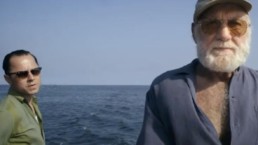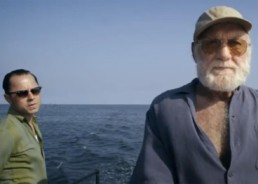‘Papa: Hemingway in Cuba’ Shows the Dark Days of a Genius in Crisis
This is a custom heading element.
In literature, there is a term called the “Hemingway Hero,” which is essentially a set of noble traits and honorable qualities that the reader should aspire to, much like any character in an Ernest Hemingway novel. Every writer attempting to create this attribute will find that the qualities that make up a hero today compared to that of Hemingway’s day are consistent and timeless. This idea of what makes a man a man, and living a life of “honor, courage and endurance in a world that is sometimes chaotic, often stressful, and always painful” will forever ring true to those in search of a deeper meaning of life. The Bob Yari-directed film Papa: Hemingway in Cuba, tells the true story of one man’s relationship with the legendary writer Ernest Hemingway, and essentially starting his journey to find his own, literal, “Hemingway Hero”.
“What do you say to the man who changed your life, and never even knew you?” Ed Myers (Giovanni Ribisi), a journalist at the Miami Herald in the 1950s, asks this question while struggling to find the words for a letter he plans to send to his idol, Ernest Hemingway (Adrian Sparks). Growing up an orphan during the depression, Myers’ voice-over explanation reveals that he had always wanted to be a writer and an adventurer. His lack of family ties created a longing for someone to look up to, someone to be a father figure. He writes all of this and more in his letter, spilling his soul onto the page. Then, one day, Myers gets a life-changing phone call from the man himself, telling him how much he appreciated the letter and then asking him to travel to Cuba to spend time with him.
While the first third of the film tends to drag a bit slowly, it really comes alive when we follow Myers to Cuba and get to meet Hemingway. The atmosphere of the city and live music are electrifying, a juxtaposition to the man Hemingway had become by that point in his life. Myers quickly develops a closeness to Hemingway and his wife Mary (Joely Richardson), considering them the family he never had. However, their blissful life erupts into chaos as they immediately find themselves in the middle of the Cuban revolution.
The fact that this is a true story alone is worth watching, but probably the biggest selling point is that this is the first Hollywood film to be shot in Cuba in over 50 years. The authenticity of being able to shoot in the original locations including the bar El Floridito and Hemingway’s actually home in Finca Vigia, which is now preserved as a national museum, is a fascinating thing to see. Possibly the coolest memento of all, though, is that the typewriter used in the film is Hemingway’s original one.
Personally, a big fan of Hemingway myself, (I did name my dog Ernest after all), seeing this time period in his life is difficult as we all know the outcome of his losing battle with depression. It is a hard pill to swallow watching him stick a revolver in his mouth and beat his wife. For as beautiful the worlds he created in his books, the man we see on screen is a tortured artist that is struggling to see the purpose of his own life. Adrian Sparks captures both Hemingway’s brilliance and demons in his performance, truly giving justice and respect to the late author.
As much as you become absorbed in Sparks’ performance, there are moments that can take you out of the film. At times Ribisi comes off somewhat flat, for example, getting that initial call from his idol, Hemingway himself, he barely seems to muster up any excitement. Instead, it feels as if that scene may have been rehearsed one too many times and, by that take, he was just going through the motions. Another head scratching moment is how quickly the film jumps into some scenes without much setup. One moment, Myers is on the beach in Cuba, the next he’s on the beach in Florida telling his girlfriend (Minka Kelly) about his trip to Cuba. It feels rushed, but at this point, we’ve become invested in these characters that we’re along for the ride so we don’t really care where we’re going or how we get there.
Papa: Hemingway in Cuba is a stunning portrait of one of the greatest authors and storytellers of the 20th century. Bob Yari takes the biopic and breathes life into the genre just by the sheer amount of authentic details (like the shooting locations alone), plus this inspiring and true story of one man’s search for the meaning of life is something we can all relate to. Bonus- Keep an eye out for a quick cameo from Ernest’s granddaughter Mariel Hemingway.
Papa: Hemingway in Cuba is rated R for language, sexuality, some violence, and nudity. Opens in select theaters on Friday, April 29th.
Morgan Rojas
Certified fresh. For disclosure purposes, Morgan currently runs PR at PRETTYBIRD and Ventureland.


